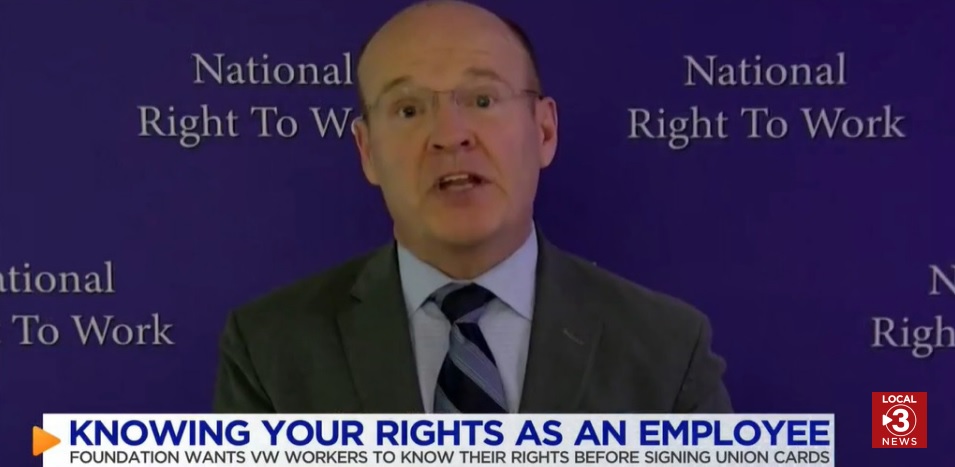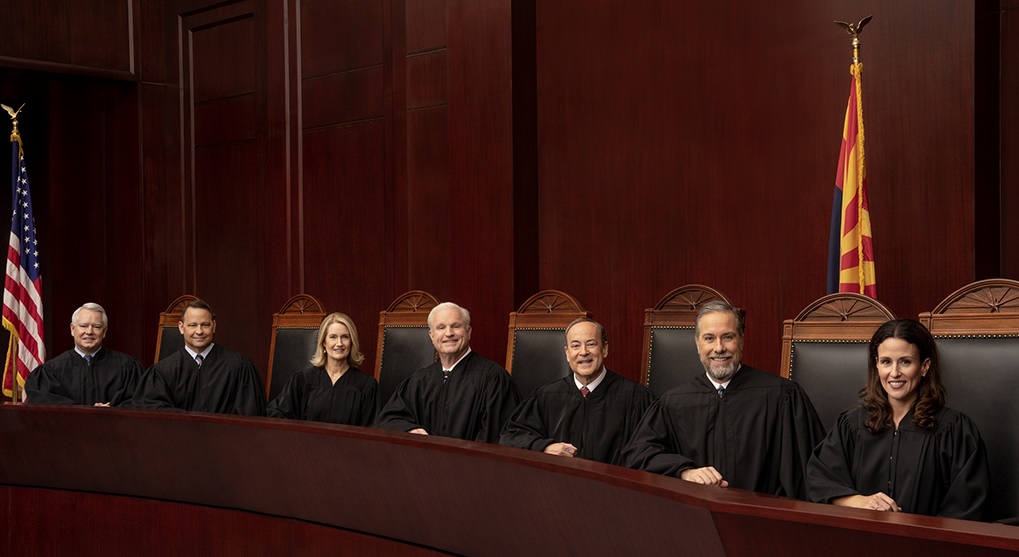DC-Area Transdev Driver Takes Case Regarding Union-Instigated Assault to Federal Appeals Court
Biden Labor Board claims ATU union did not violate law even after worker experienced slap and termination attempt from union officials
Washington, DC (July 1, 2024) – Thomas McLamb, a Hyattsville, Maryland-based driver for transportation company Transdev, is appealing his National Labor Relations Board (NLRB) case charging Amalgamated Transit Union (ATU) officials with assaulting him to the D.C. Circuit Court of Appeals. McLamb, whose case concerns retaliatory actions taken against him for being a union dissident, is receiving free legal aid from the National Right to Work Foundation.
McLamb filed charges with the NLRB in November 2021 and January 2022 against ATU for the retaliatory behavior, which in addition to being slapped by an ATU union steward also included a union-instigated termination attempt. McLamb argues that engaging in legally-protected action opposing the union hierarchy – including petitioning for an NLRB-supervised vote to remove the union – made him a target of union officials and adherents.
NLRB Region 5 in Baltimore issued a Complaint and Notice of Hearing on May 11, 2021, stating that the slap and an attempt by an ATU shop steward to get McLamb fired both constituted violations of federal labor law. An NLRB Administrative Law Judge (ALJ) issued a decision declaring that the firing attempt was illegal, but the Biden NLRB reversed, claiming that the union did not violate the law at all.
McLamb is now asking the D.C. Circuit Court of Appeals to review and overturn the decision of the Biden NLRB.
ATU Union President Ordered Adherents to “Slap” Dissenters
In a statement filed in November 2021, McLamb said that the ATU Local 689 president, Raymond Jackson, told other union officers to “slap” employees who were opposing his agenda. McLamb later reported in a federal charge that he had been physically assaulted by ATU shop steward Tiyaka Boone. Both incidents occurred while McLamb was campaigning against the incumbent officers to serve on Local 689’s board.
McLamb reported in another federal charge that, shortly after this incident, ATU official Alma Williams requested that Transdev management fire him over his criticisms of the union steward that assaulted him.
Biden NLRB Decision Claims Physical Assault Was Personal
The Biden NLRB’s decision reversing the ALJ decision against the union claims that Boone’s assault on McLamb was motivated by “personal reasons” and not McLamb’s legally-protected opposition to the union’s chiefs. However, both McLamb’s Foundation attorneys and even the NLRB General Counsel showed the ALJ during trial a video of Jackson, the ATU president at the time, telling employees to slap other workers who spoke out against him.
The NLRB decision also defends Alma Williams’ asking the employer to fire McLamb, claiming that she was merely asking for Boone and McLamb to be disciplined “equally” for their conduct during and leading up to the assault.
“Workers should not have to face violence or retribution in exchange for criticizing or challenging union leadership, and the fact that Mr. McLamb has had to fight for years to defend his right to be free of such retaliation is outrageous,” commented National Right to Work Foundation President Mark Mix. “We believe that this decision by the Biden NLRB is wrong, and is yet another example of how the current administration defends scofflaw union bosses that steamroll employee rights in pursuit of greater power.
“Even worse is the fact that McLamb works in the non-Right to Work state of Maryland, where union officials are legally empowered to require dues payments as a condition of keeping one’s job,” Mix added. “No worker should be forced to fund a union hierarchy they disapprove of, let alone one that is actively fighting the worker in court.”
Detroit School Bus Driver Slams Teamsters Union With Federal Charges for Seizing Full Dues Illegally From Paycheck
Teamsters officials ignored First Student driver’s request to opt-out of funding union politics, similar cases increase after MI Right to Work repeal
Detroit, MI (June 14, 2024) – Frances Dennis, a Troy-based school bus driver for First Student, Inc., has just filed federal charges against Teamsters Local 299 union officials for seizing full union dues payments from her wages even though she resigned her membership in the union. Dennis filed the charges at National Labor Relations Board (NLRB) Region 7 in Detroit with free legal assistance from National Right to Work Foundation attorneys.
Dennis is seeking to defend her rights under the Foundation-won Communications Workers of America v. Beck Supreme Court decision, which forbids union officials from forcing employees who have abstained from union membership into paying dues or fees for anything beyond the union’s core bargaining functions. Union political expenditures, which often make up part of full membership dues, are among those expenses that Beck prevents union officials from forcing nonmember workers into funding. Nonmember workers who exercise their Beck rights are also entitled to an independent audit of the union’s finances and a breakdown of how union officials spend forced contributions.
In non-Right to Work states, including Michigan where Right to Work was repealed earlier this year, union officials’ privilege to force workers to pay dues or fees as a condition of employment is limited by the Beck ruling. Under federal law and U.S. Supreme Court precedents like General Motors v. NLRB, union officials also can’t compel workers to maintain formal union membership as a condition of getting or keeping a job.
In Right to Work states, in contrast, both union membership and all union financial support are strictly the choice of each individual worker.
Teamsters Continue to Take Money for Politics Unlawfully From School Bus Driver
According to the charges, in December 2023 Dennis sent a letter to Teamsters union officials exercising both her right to resign union membership and her right to cut off union dues deductions from her paycheck. At the time, Michigan’s Right to Work law was still on the books, meaning Teamsters union officials should have honored both of Dennis’ requests. However, her charges state that Teamsters agents “did not respond to this letter and continued to deduct dues from her wages.”
Knowing that the Michigan Legislature had set the Right to Work repeal for February 2024, Dennis sent another letter in January 2024 “objecting to the demand of any dues or fees without the protections guaranteed by Communications Workers of America v. Beck.” She also objected to union officials taking dues from her paycheck. Even where forced-dues arrangements are legal, federal law prohibits union bosses from requiring the payment of such dues through direct payroll deduction.
Dennis’ charges report that Teamsters union bosses have not responded to her letter, have not provided her with any of her Beck rights, and continue to seize full union dues out of her wages. Even worse, a union recording secretary told Dennis via text that “she was required…to complete and submit a dues checkoff form” authorizing direct dues deduction as a condition of keeping her job.
After MI Right to Work Repeal, Cases Challenging Forced Dues Pile Up
Dennis’ case is just the latest in a string filed by Foundation attorneys for Michigan workers seeking to challenge union bosses’ forced-dues arrangements in the wake of Michigan’s Right to Work repeal. Earlier this month, Sault Ste. Marie Meijer employee Joseph Arnold hit his employer with federal charges for compelling him to sign a United Food and Commercial Workers (UFCW) union membership form. In Milford, Kroger employee Roger Cornett levied federal charges against both a UFCW local and the store for jointly enforcing a scheme that forces employees to contribute to the union’s Political Action Committee (PAC) to stay employed. James Reamsma, a Grand Rapids-area security guard, is defending a “deauthorization vote” by security guards across Western Michigan to end the forced-dues power of a United Government Security Officers of America (UGSOA) union.
“The Michigan Legislature’s cynical and partisan repeal of Right to Work was a blatant power grab for union bosses across the state at the expense of workers’ right to freely decide whether union bosses have earned their financial support,” commented National Right to Work Foundation President Mark Mix. “As Ms. Dennis’ case and an increasing number of cases from around the state show, union bosses often seek to circumvent or flat out ignore workers’ free association rights, which is why those freedoms deserve stronger and not weaker protections.”
“Perhaps more unsettling is the fact that some of these cases involve union officials illegally funneling worker money into union politics – the same political machine that led to the demise of these workers’ free choice under Right to Work,” Mix added.
Michigan Meijer Employee Hits Supermarket with Federal Charges for Forcing Him to Join UFCW Union or Be Fired
Charges come as more workers challenge union bosses’ forced-dues power in wake of Michigan Right to Work repeal
Sault Ste. Marie, MI (June 11, 2024) – Joseph Arnold, an employee at the 3 Mile Road branch of Meijer in Sault Ste. Marie, has just slammed the supermarket’s management with federal charges for threatening to fire him if he didn’t complete a United Food and Commercial Workers (UFCW) union membership form. Arnold filed the charges at Region 7 of the National Labor Relations Board (NLRB) with free legal aid from National Right to Work Foundation staff attorneys.
The NLRB is the federal agency responsible for enforcing federal labor law in the private sector. Under federal law and U.S. Supreme Court decisions like General Motors v. NLRB, neither union officials nor employers can compel workers to maintain formal union membership as a condition of getting or keeping a job.
This applies even in non-Right to Work states like Michigan, where union bosses have legal privileges to enforce contracts that require workers to pay union dues or fees as a condition of employment. Employees in non-Right to Work states who choose to abstain from formal union membership also have the right under the Foundation-won Communications Workers of America v. Beck Supreme Court decision to object to paying union fees for anything unrelated to the union’s bargaining functions, such as political activities.
In contrast, in Right to Work states like neighboring Indiana and Wisconsin, all union financial support is strictly voluntary.
With the demand that Arnold sign a UFCW membership form or else be fired, Meijer officials appear to be imposing both full union membership and full union dues payments on him. Other workers have reported receiving similar demands to join or be fired.
Workers Across Michigan Challenge Forced-Dues Schemes
“Even though Michigan isn’t a Right to Work state anymore, that doesn’t give my employer agency to dictate my options,” commented Arnold. “Through ignorance or intent, Meijer threatening my job because I don’t want to associate with the union is unacceptable. If Meijer truly respects our rights they would present us with all options, as it is the job of the union to advocate my interests with my employer, not the job of my employer to advocate the interests of the union with me.”
Since the state’s Right to Work law was repealed earlier this year, Foundation attorneys have handled a flurry of cases for Michigan workers seeking to end coercive union influence in their workplaces. One such case involves illegal UFCW practices at a Kroger in Milford, Michigan, where employee Roger Cornett has levied federal charges against both the union and the store for jointly enforcing a scheme that forces employees to contribute to the union’s Political Action Committee (PAC) to stay employed.
Elsewhere in Michigan, Grand Rapids-area security guard James Reamsma is currently defending his and his coworkers’ recent “deauthorization vote” to nullify the forced-dues power of a United Government Security Officers of America (UGSOA) union. The UGSOA currently holds monopoly bargaining power over security guards posted at government buildings across Western Michigan, including in Sault Ste. Marie. Even though more of Reamsma’s colleagues voted for the deauthorization of the UGSOA than against it, litigation continues over the results. Reamsma’s case is one of many where Michigan workers are seeking to end union bosses’ power to compel payment of union dues or fees, and return to voluntary dues payments, as was protected under Michigan’s popular Right to Work law.
“Based on the cases that Foundation attorneys have already fielded in the short time that Michigan’s Right to Work law has been repealed, it’s clear that Michigan workers need more protection from coercive union power, not less,” commented National Right to Work Foundation President Mark Mix. “Union officials and complicit employers will often push the boundaries of what’s legal in an attempt to extend union power over workers regardless of whether they want or asked for the union.”
DHS Security Guard’s Federal Lawsuit Forces IGUA Union Bosses to Stop Illegal Forced Union Dues Demands
After union officials did not provide legally required financial disclosures, guard wins reduction in mandatory union fees
Washington, DC (June 6, 2024) – Rosa Crawley, a security guard at the Department of Homeland Security’s Nebraska Avenue Complex, has triumphed after filing a federal lawsuit charging the International Guards Union of America (IGUA) with unlawfully demanding and seizing union dues from her paycheck. Crawley, who is employed by Master Security, forced the union to back off its illegal dues demands with free legal aid from National Right to Work Foundation staff attorneys.
Crawley is not a member of the IGUA union, but is still subject to IGUA’s monopoly bargaining power over the security guards at the DHS Nebraska Avenue Complex. As part of the settlement, IGUA union bosses must reduce the compulsory fee that they seize from Crawley as a condition of keeping her job. Before she filed suit, union bosses demanded the equivalent of full membership dues from her.
In her federal lawsuit, which she filed at the U.S. District Court for the District of Columbia, Crawley sought to defend her rights under the 1988 Right to Work Foundation-won CWA v. Beck Supreme Court decision.
While union officials can force private sector workers in non-Right to Work jurisdictions like the District of Columbia to pay dues or fees just to keep their jobs, the Beck decision prevents union bosses from forcing employees who have abstained from union membership to pay for anything beyond the union’s core bargaining functions, such as union bosses’ political activities. Full membership dues often contain charges for these unrelated items.
Beck also requires union bosses to furnish nonmembers who invoke their rights under the decision with an independent audit of the union’s finances and a breakdown of how union officials spend forced contributions.
Beck protections aren’t necessary in Right to Work states like neighboring Virginia, where union membership and all union financial support are fully voluntary.
IGUA Union Bosses Took Full Dues from Guard, Provided No Financial Disclosures
According to the suit, Crawley sent a letter to union officials resigning her union membership back in July 2023. Instead of immediately providing her with her Beck rights, union officials informed her that she would be charged a so-called “agency fee” which “is the same exact cost as what the union members pay.”
“So there will be absolutely no change in a financial sense,” the union’s reply letter stated.
Not satisfied with that explanation, Crawley in September 2023 formally invoked her Beck rights and asked union officials to reduce her dues payments in accordance with the decision. She also asked them to “provide [her] with an accounting, by an independent certified public accountant, that justifies Local 160’s calculation of its agency [forced] fee,” according to her lawsuit.
In an October 2023 reply to her Beck request, union officials used a confusing percentage averaging calculation to determine a fee amount that contradicted what they told Crawley when she resigned her membership. An independent audit of the union’s finances was nowhere to be found. Despite that, Crawley’s lawsuit reported that IGUA bosses continued to collect full union dues from her paycheck, and tried to impose extra steps that would need to be completed if she wanted to see the union’s financial info.
Workers Must Be On Guard for Illegal Union Uses of Worker Funds as Election Nears
After the filing of her lawsuit, Crawley expressed concern that her money was flowing toward union politics while IGUA bosses dragged their feet on honoring her Beck rights. “I shouldn’t have to pay for the IGUA union’s political activity just so I can continue to do my job,” commented Crawley. “Union officials have a legal obligation to stop charging me for politics and provide me with an accounting of how they are using my money, and so far they have done neither. This isn’t how they should treat the workers they say they ‘represent.’”
“We’re pleased that Ms. Crawley was able to terminate IGUA union officials’ outrageous seizure of full union dues from her paycheck,” commented National Right to Work Foundation President Mark Mix. “However, IGUA union officials’ inability to follow even the modest limitations that Beck places on their ability to impose mandatory dues on workers is ridiculous, and no worker should have to file a federal lawsuit to force union bosses into recognizing those rights.
“Workers’ right to prevent their money from going toward unwanted union activities, particularly politics, is especially important as union bosses try to push forward their agendas in advance of the 2024 election,” Mix added. “So workers should be vigilant of Beck violations, and remember they can contact Foundation attorneys for free legal aid in exercising their rights under that decision.”











